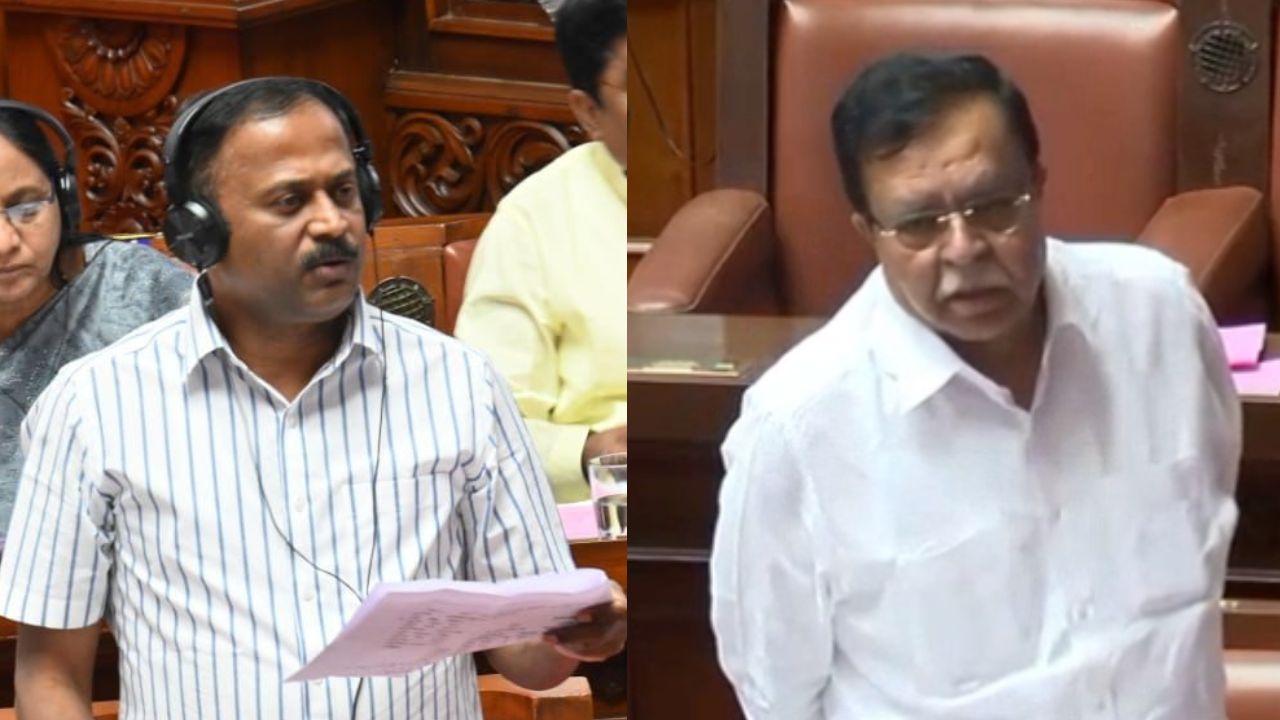The National Bank for Agriculture and Rural Development sanctioned ₹5,600 crore for Karnataka in 2023-24, but only allocated ₹3,226 crore in 2024-25, Cooperation Minister KN Rajanna told the Legislative Council.
Published Mar 11, 2025 | 7:27 PM ⚊ Updated Mar 11, 2025 | 7:27 PM

Congress MLC Dinesh Gooligowda and Cooperation Minister KN Rajanna. (Supplied)
Synopsis: The National Bank for Agriculture and Rural Development slashed Karnataka’s agricultural credit allocation by 58 percent for 2024-25, reducing funds available for cooperative banks to lend to farmers, Cooperation Minister KN Rajanna told the Legislative Council. Despite the reduction, the minister assured that the state would still meet its ambitious loan disbursement target of ₹27,000 crore for the present financial year.
The National Bank for Agriculture and Rural Development (NABARD) reduced its financial assistance to Karnataka by 58 percent for the year 2024-25, limiting funds available for cooperative banks to disburse loans to farmers, Cooperation Minister KN Rajanna told the Legislative Council on Tuesday, 11 March.
NABARD sanctioned ₹5,600 crore for Karnataka in 2023-24, but only allocated ₹3,226 crore in 2024-25, Rajanna said, responding to a question from Congress MLC Dinesh Gooligowda.
Despite the cut, he assured the Council that the state would still meet its agricultural loan disbursement target of ₹27,000 crore for the current year, set by Chief Minister Siddaramiah during his budget presentation earlier this month.
NABARD provides credit and development assistance to rural banks, cooperative banks, and other agricultural lenders. It plays a crucial role in financing the country’s rural economy, ensuring farmers receive affordable loans to buy seeds, fertilisers, equipment and more.
State governments depend on NABARD’s financial assistance to ensure cooperative banks – one of the primary sources of agricultural credit – have enough liquidity to lend at lower interest rates to small and marginal farmers.
NABARD typically provides only 30-40 percent of required funds, with state Apex Banks and District Cooperative Central Banks managing the remaining through their own capital and deposits.
Rajanna said the Karnataka government has requested the Centre for additional financial support, with both Chief Minister Siddaramaiah and Cooperation Department officials appealing to NABARD.
As a result, NABARD sanctioned an additional ₹896 crore in a second phase of funding, bringing the total allocation for 2024-25 to ₹3,226 crore.
Cooperative banks in Karnataka disbursed ₹15,960 crore in loans to 21 lakh farmers last year, Rajanna told the Legislative Council.
This year, the government has set a higher loan disbursement target of ₹27,000 crore for 37 lakh farmers. The state requires ₹9,219 crore in agricultural credit to meet demand.
“The chief minister’s loan target will be met, no matter what,” Rajanna said. “We are in constant talks with NABARD and the central government, and we hope for further support.”
The Cooperation Minister further noted that NABARD’s financial assistance, rather than increase by 10-20 percent annually as expected, has been declining over the past five years.
In response to Gooligowda’s question about whether the state government’s delay in submitting financial proposals to NABARD had directly contributed to the funding cut, either due to procedural inefficiencies or bureaucratic lapses, Rajanna stated that the reduction in NABARD’s financial assistance was a nationwide issue, not unique to Karnataka.
He asserted that multiple states had experienced similar cuts, asserting that Karnataka had submitted all necessary proposals on time and in accordance with NABARD’s requirements.
(Edited by Dese Gowda)
